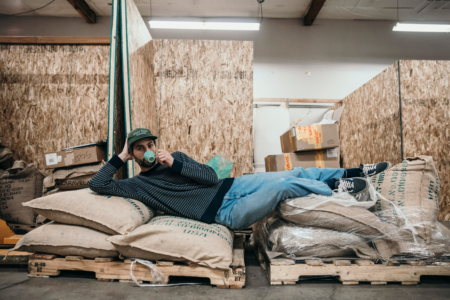Ground Control
Snowboarder Alex Yoder takes a Regenerative Organic approach to his new coffee business by thinking like an astronaut.
By the time Alex Yoder was a decade deep into his snowboarding career, he was scared. Raised in the steep mountains of Jackson, Wyoming, Alex was following in the footsteps—often literally—of the professional snowboarders he idolized, a relentless pursuit of bigger jumps and more technical lines. If there was a formula for success in the backcountry, he was diligently following it: increase the difficulty of what you do and then do it better, year after year.
“The night before I would go into the backcountry to hit a big jump or ride lines of consequence, I rarely got any sleep because I was so afraid and anxious,” he remembers. “The things I was doing were terrifying. I knew I was capable of doing them, but I would get hurt because I wasn’t in the right headspace.”
Then Alex knocked himself out attempting a trick on an 80-foot gap jump 15 miles deep in the backcountry. “The group I was with didn’t ask if I needed a hospital, they asked if I was going to be able to hit the jump again. I realized I wasn’t giving myself a lot of options if something went wrong. I couldn’t do it anymore.”
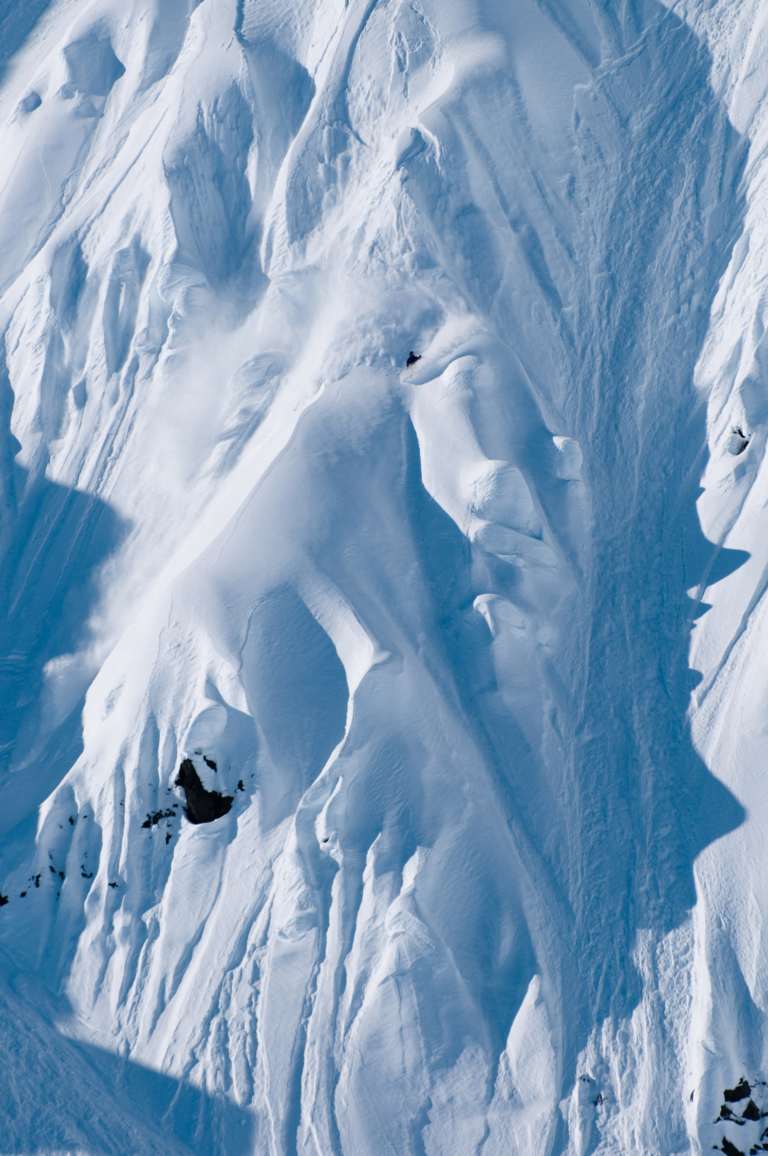
Alex always finds a way—whether with a new approach to storytelling in the snowboarding industry, activist paths that resonate with his personality or a big sunny line in Alaska. Photo: Phil Tifo
The emotional tension came to a head during a snowboarding trip on Japan’s north island of Hokkaido as Alex watched another group of snowboarders encroach on the untouched snow.
“I was so stressed about them getting the first tracks,” he remembers, “but my new Japanese friends didn’t seem to be in a hurry at all as I gave them the ‘go-ahead’ hand motion. I had an epiphany at that moment: ‘What is wrong with me? I’m literally centering my life on strapping slippery sticks to my feet and sliding down a mountain, but I’m just aggressive and anxious and afraid all the time.’ I realized that where I saw scarcity, my new friends saw abundance and it dawned on me that the way I was snowboarding didn’t align with my soul.”
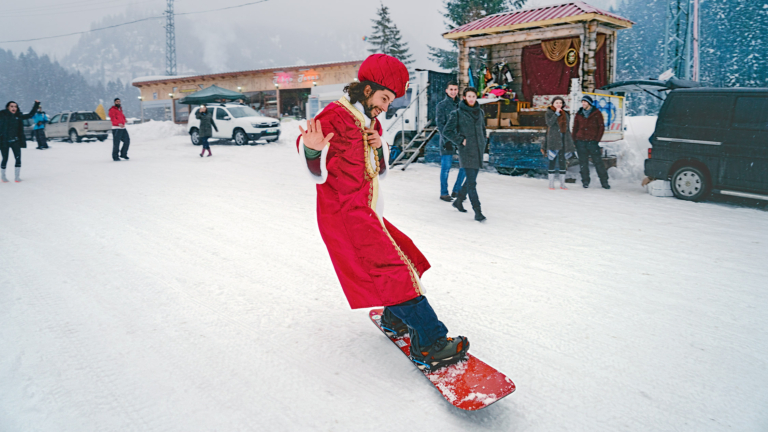
Alex slashes the streets while wearing some local Turkish garb borrowed from a costume photo booth, all part of the Snowman Festival (which didn’t really have anything to do with snowmen, as it turned out). “Foothills: The Unlinked Heritage of Snowboarding” is a film Alex helped create from this trip to Petran, Turkey, and how the locals there have been snowboarding for over 300 years. Photo: Wade Dunstan
So, he realigned. Alex joined the team at Japanese board-maker Gentemstick and began pursuing more documentary-style snowboarding films that explored cultural and environmental nuances of riding in places like Scotland and Turkey. While other riders push the technical limits of snowboarding, Alex has used the sport as conduit for exploring community and tradition. For it all, he’s become an icon in his own right, both for his stylish turns and slower, more contemplative approach to snow narratives.
“That one moment changed everything for me,” he says. “I can ride the way I do now well into my 70s, and I’m finding joy in it again. I’m experiencing the sport less through adrenaline and more through a heightened sensitivity to the way the board interacts with the mountain.”
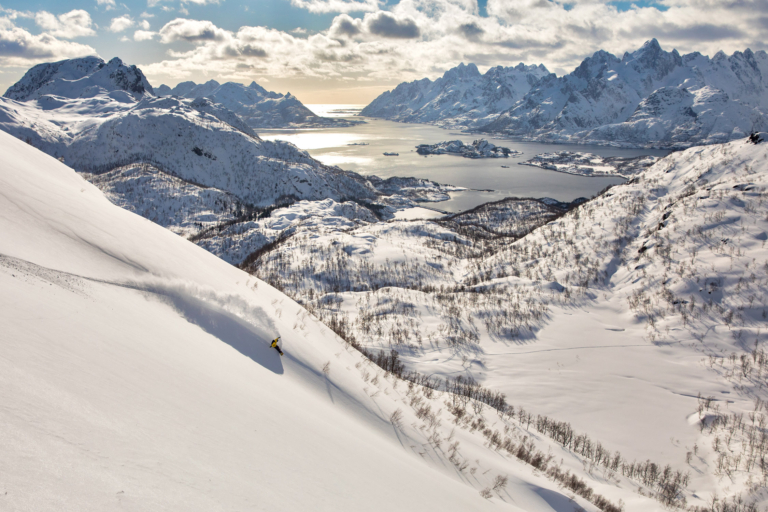
Getting some perspective in Northern Norway on a trip in 2018. Photo: Andrew Miller
The same ideological shift that led Alex to seek out new avenues within snowboarding also led him to his newest venture: Overview Coffee. Rooted in Regenerative Organic practices, it’s an ethical take on the coffee business focused on how humans can interact with the planet in a more natural, harmonious way. Overview sources coffee from farms that prioritize environmental stewardship through a long-term approach to soil health, biodiversity and community stability—working with what exists in nature to grow crops instead of in opposition to it. In many ways, it’s a return to more traditional ways of farming and stewarding land.
“I first heard the term ‘Regenerative Organic’ during a fly-fishing trip with Patagonia employees and [Patagonia founder] Yvon Chouinard happened to be there. Everyone wanted to talk to him about business and what products to make and stuff, but he was like ‘Ah, we make too much stuff already!’” Alex laughs. “So when I could, I was just peppering him with questions about the original ‘Fun Hogs’ trip he did in the ‘60s and got these amazing stories about them sneaking into churches to sleep, stealing candles to wax their surfboards. Yvon is, like, a foot shorter than me so he had his nose in my back trying to teach me how to fish by holding my arm and making my arm do the motions.”
But there was another more important question Alex posed on that trip: if Yvon, a self-proclaimed pessimist, had dedicated his life and business to the environmental crisis, did he believe there were any solutions? Yvon saw the answers in the soil, and Alex became inspired to start a business that might help regenerate it.
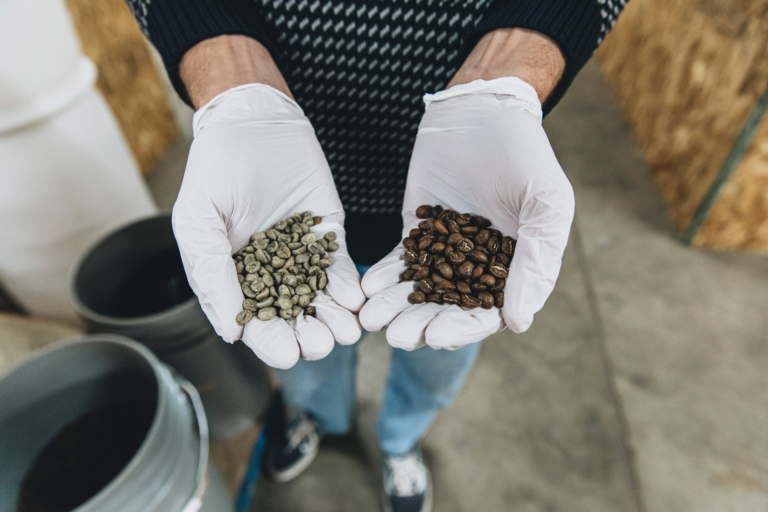
Who doesn’t love coffee? Raise your hand. Not many of you? That’s what we thought. Alex and some of his newly roasted bean babies (right). His quest with Overview is to bring all of us who didn’t raise our hands, and our freakish coffee habits, and turn them into something that could help the planet—or at least do better by it. Photo: Johnie Gall
If I’m the least qualified person to be writing about a coffee business (my go-to order is Dunkin’ on the rocks), then Alex may be the least qualified to run one—he didn’t actually drink coffee until starting Overview last year. But by the time he pours me my sixth shot of espresso inside the Portland-based roastery where Overview coffee is finished, I get it: If you’re setting out to change the world, start with what people already care about. For Alex and his cofounders, Overview is a way to take the daily habit of more than half of the global adult population and try to turn it into a possible solution for the climate crisis.
“No one wakes up in the morning and says, ‘I can’t wait to have some corn,’” says Alex (which promptly causes me to snort some organic, shade-grown Ethiopian blend out of my nose). “People have an emotional connection to coffee, which matters because as the climate keeps changing, we may not be able to grow it anymore.”
Coffee is grown in what’s called the “Bean Belt,” the specific set of latitudes hovering around the equator in which we can cultivate coffee. As the planet warms, the mountainous, subtropical regions where coffee can grow are shrinking—the situation is so dire that half of current coffee farms could be unable to grow coffee by 2050. It’s indicative of both an environmental emergency and a human one: Communities that have survived off farming crops like coffee for generations are being “weathered out” of their livelihoods and homes.
“In conventional coffee farming, you cut down the indigenous forest to make room for more coffee, but coffee needs shade to grow—now you have to solve for that by creating synthetic growing conditions. Regenerative Organic farming is solving for multiple problems at once by considering the utility of all forms of life involved in a system,” says Alex. “You’re thinking about the fungi, the worms, the birds, what animals are pooping there, what the rainfall looks like.”
This zoomed-out, bird’s-eye-view approach is all very analogous to Alex’s epiphanic moment in Hokkaido—and fitting, considering Overview is named after the cognitive shift in awareness experienced by astronauts seeing Earth from space for the first time.
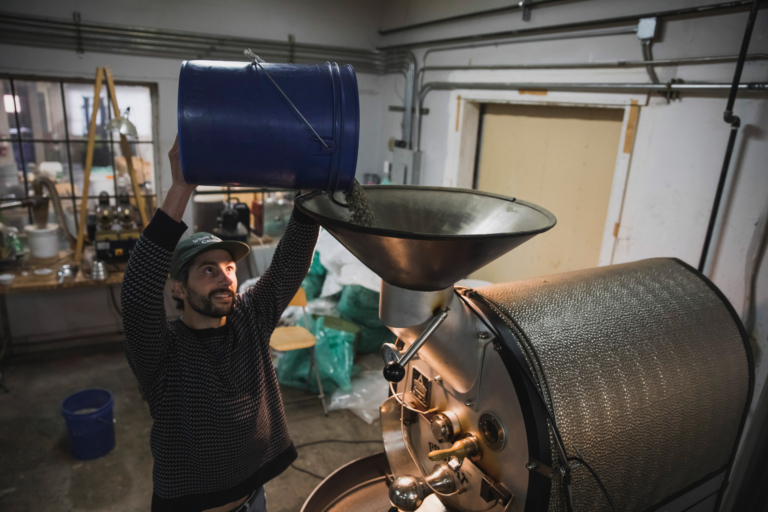
For a guy who never drank coffee before starting Overview, Alex seems to be catching up quickly. Here he feeds the hungry roaster to bring you beans that are better for the biosphere. Sips that support Regenerative Organic land practices. And a jolt that you can justify. Photo: Johnie Gall
“They call it a ‘ball of life hanging in the void,’” Alex explains. “It’s the only place we know life exists in this immeasurable universe—it’s incredible, and when the astronauts brought back this perspective in the ‘60s during the Apollo missions, it helped start the environmental movement. A lot of people might say being an activist only means marching down the street, holding a sign saying how you feel. But I also see Overview as a form of functional activism—taking a product that other companies produce and doing it in a way that benefits the planet instead of just harming it.”
Not everyone will get to see Earth suspended in space, but most of us will drink coffee: It’s something more than half of all adults on the planet consume daily. Alex wants to change coffee drinkers into active stakeholders in an agricultural revolution simply by making us more conscious of what’s in our cups. It’s a quieter, more pragmatic type of environmentalism—one that parallels Alex’s uncommon approach to snowboarding.
“I was trying to fit in a box that I made based on what I saw being celebrated in the industry. It took a few hard slams to even consider an alternative because there wasn’t an example of how to do it differently. Getting to the point of giving it up allowed me to open up my perspective on what snowboarding could mean to me, and that’s when I found my place in it.”
